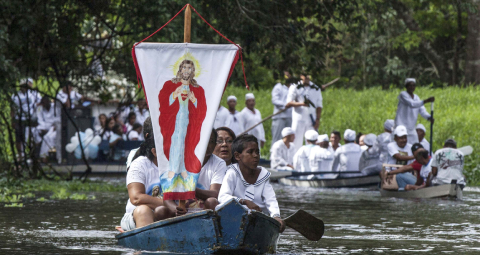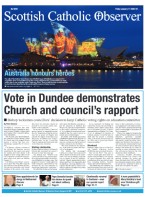November 8 | ![]() 0 COMMENTS
0 COMMENTS ![]() print
print

Married priests? Let’s go with the Holy Spirit
Joe McGrath finds good grounds for allowing fundamental change.
I remember my first visit to Sub-Saharan Africa very well. When I reached the door of the aircraft at the airport in Accra, Ghana, I was hit by two things. First was the heat; it was like I had walked into a furnace. The second thing was the exotic smells of Africa. It was plain I’d come to a place very different from home. Glasgow had never smelt as exciting as this.
I was working with Missio Scotland at the time and I was there to discover how we were helping the growing Church in Ghana. We were met by Mgr Roger who took us to his home area of Bolgatanga in the far north of the country. While we were there we visited the home of the local chief and his extended family. His home was a small compound of mud huts. At the entrance to the compound I noticed two strange structures. I asked what these could be and was told that they were where animals were sacrificed to the various gods.
But surely these people were Christian, Catholics indeed? The answer was instructive. When a family converted, one member would not convert but remain with their old religion. That person would continue to offer sacrifice for the family to the old gods — just in case.
Superstition
That made me think about being a Catholic in Scotland. Have we thrown off all the old pagan beliefs? What about all those superstitions we still cling on to? If a black cat crosses your path do you still get a shiver down your spine? If you spill the salt do you still toss a pinch over your shoulder?
Think about the pagan gods that still exist in our calendar; January is named after the god Janus, March after Mars, the god of war. Thursday is named after Thor, the Norse god, not the Marvel hero.
By now some of you may be suspecting that I’ve lost the place. “Why is he going on about all this old stuff?” you may ask. Well, I think this is pertinent to some of the debate going on in the Church today.
Pope Francis is using the Amazon Synod to examine how we, as a Church, can respond to the needs of those in South America whose remoteness makes it difficult for the Church to reach out to them. They are looking at the possibility of married men being priests.
Celibacy
This has provoked many to respond in defence of the traditional position of the Church that priests should be celibate and to cast doubts on the validity of the Faith of those in these remote areas. There is a suspicion that these strange people are still really pagans at heart; not like us. So how do we tell if someone is really Catholic?
Well, first of all they have to be Christian; they have to be a follower of Jesus Christ. That entails trying to live according to His teaching. By that measure British society would not qualify as Christian as our laws do not respect the gift of human life. To be Christian we need to try to follow Jesus’ command to love God and love our neighbour. You could say that Jesus was not a Christian as He was not a follower of Himself. Jesus was a Jew and his religious practice was Jewish.
In the tribal areas of the Amazon the culture is not that of Scotland. It is expected of men to be married. An unmarried man would not be regarded as a figure of authority. But even in the UK we have recognised married priests. When Anglican priests felt compelled to leave the Anglican Church over the decision to have women priests, they were welcomed into the Catholic Church along with many of their parishioners. They could be accepted into the Church as they accepted the authority of the Pope. That’s how we know we are Catholics.
Baptism
It’s comforting to think that we get baptised as children and we are in the Church for life. While the Church may not reject the baptised, many of those baptised as children grow up to drift away from the Church. Are they still Catholics if they are not practising? The reality is that many people drift in and out of the Church. Many still carry the outward signs of being a Catholic in their adherence to a ‘Catholic’ subculture. How does the Church respond to those of a different culture?
This is a problem the Church faced in its earliest days. When Paul went to Antioch to spread the Good News, he did not restrict his preaching to the Jews. He made converts among the pagans who were moved by the Holy Spirit. This caused a great controversy. The early Christians were Jews who still followed their Jewish religious practice. They identified their faith in Jesus with their culture and could not accept one could be a follower without adopting all the trappings of Judaism.
The apostles had to rule on this dispute. They recognised that conversion was the work of the Holy Spirit and that these new converts were, therefore, chosen by God. They ruled that the pagan converts could be members of the Church and only had to follow simple rules against idolatry, fornication and abstaining from the meat of strangled animals. It seems to be, then, that Christianity was recognised as something from the Jewish tradition but not something of that tradition, it was a new Church.
Missionaries
It seems to me, then, that the Church must be open to people of many different cultures and has a duty to make it possible for the Amazonian people to play a full part in the Church. The apostles’ decision also points us to the role of the Holy Spirit. Africans I met told me that the missionaries did not bring God to Africa. God was working among the people before they came. The missionaries brought the Gospel.
The Church has to remember that evangelisation is the work of the Holy Spirit and we must follow His lead. We are not the driving force in spreading the Word. We merely follow where the Holy Spirit leads us.










